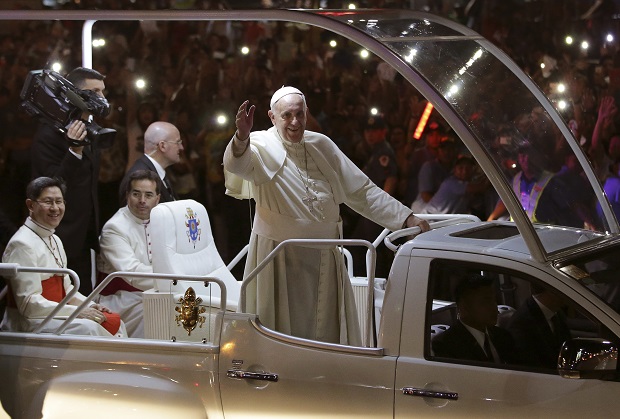
Pope Francis, right, accompanied by Cardinal Luis Antonio Tagle, left, archbishop of Manila, waves to Filipinos as he arrives in Manila, Philippines Thursday, Jan. 15, 2015. Ecstatic crowds greeted Pope Francis as he arrived Thursday in the Philippines, Asia’s most populous Catholic nation, for the first papal visit in 20 years. AP
DAVAO CITY, Philippines—While they don’t share the same beliefs with Catholics, a group of indigenous peoples in Mindanao feels a connection with Pope Francis—the Pontiff’s concern for the oppressed and downtrodden.
The “lumad” group Kalumaran has written an “uranda,” a traditional lyric poem, that contains the stories they want to tell the head of the Catholic world.
It won’t be a joyous poem, however.
The Kalumaran’s uranda narrates how lumad are being driven away from their lands for mining and logging.
Dulphing Ogan, secretary general of Kalumaran, said the uranda was the lumad’s way of re-telling history and conveying their aspirations as indigenous peoples of Mindanao.
He said, through it, the lumad wanted the Pope and the world to know the plight of indigenous peoples who are on the path of logging and mining.
“We have become victims of wanton plunder of our ancestral lands by big foreign business projects such as large-scale mining and plantations,” said Ogan.
“This has caused widespread land-grabbing of ancestral domain,” he said.
He said as 60 percent of the country’s armed forces are in Mindanao, most lumad communities are heavily militarized, resulting in the displacement of people and violation of the human rights.
“We have come to you in this frightening period of our lives and existence as indigenous peoples,” read part of the uranda, written in English by poet Dan Pagusara.
Ogan said the Mindanao lumad have already voiced out these concerns during their 14-day Manilakbayan, when they traveled all the way from Mindanao to Malacañang in early December last year, culminating with the International Human Rights Day in Manila.
“We are appealing to the Pope for him to help us reverse our plight,” Ogan said.
“We know that we, lumad, differ in our religious belief from that of the Pope, but as our uranda says, we hope that the Pope may become the channel of our prayer to Magbabaya, Supreme Deity of all deities,” Ogan said.–Germelina Lacorte